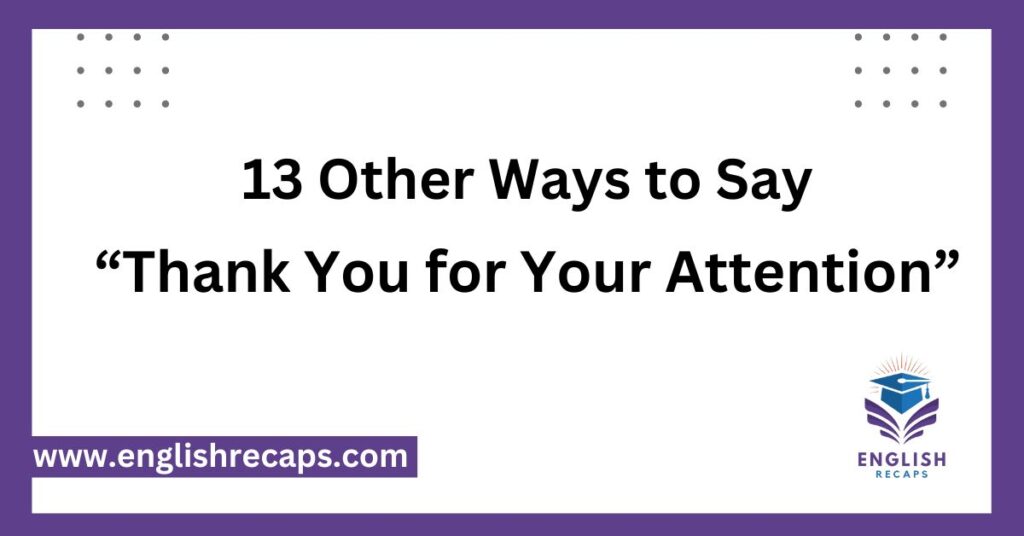Thank you for your attention is a polite way to show gratitude. It’s often used in formal settings. People say it at the end of presentations or important emails. The phrase shows respect for the listener’s or reader’s time.
But, saying the same phrase can get repetitive. You might want to keep your communication fresh. Finding new ways to express the same idea can make you stand out. This can also help keep your audience more engaged.
There are many other ways to say thank you for your attention. In this article, you’ll discover 13 different options. These alternatives are simple yet effective. They’ll help you convey your gratitude in a more unique way.
Is It Correct to Say “Thank You for Your Attention”?
Yes, it is correct to say “Thank you for your attention.” This phrase is polite and respectful. You can use it in different situations. For example, when you finish a presentation, you might say, Thank you for your attention. It shows you appreciate the time people spent listening to you. It also works well in emails. If you write an important message, you can end with this phrase. It lets the reader know you value their time.
Here’s a clear example: Imagine you are giving a speech in class. After you finish, you say, “Thank you for your attention.” This lets your classmates know you are grateful they listened. The phrase fits in many formal situations. Whether you are talking to a teacher, a boss, or a group, this phrase is simple and effective
Pros:
- The phrase is formal and shows good manners, which is appreciated in professional and academic settings.
- It clearly conveys gratitude, making it easy for the listener or reader to understand your appreciation.
- You can use it in various situations, like presentations, emails, or speeches, making it a flexible phrase.
Cons:
- Because it’s a common phrase, it can sound repetitive if used too often, especially in formal environments.
- The phrase is generic, which may not always express a deeper, more personal level of gratitude.
- LimiSince it’s widely used, it might not stand out or leave a lasting impression, especially in situations where you want to be memorable.
13 Other Ways to Say “Thank You for Your Attention”
- Thank you for your time.
- Thank you for your attention to this matter.
- I appreciate your attention.
- Thank you for your time and attention.
- Thanks for giving this your attention.
- Thank you for your attentiveness.
- I appreciate your focus on this matter.
- Thank you for taking the time to.
- I appreciate your time.
- I appreciate your timely assistance.
- Thank you for listening.
- Thank you for hearing me out.
- Thank you for your support.
You may wish to learn another related post: 25 Other Ways To Say “Thanks For The Invite”
Thank you for your time.
Thank you for your time is used to show appreciation for someone’s time and attention. It’s often said at the end of a meeting or conversation.
For example: After discussing a project with a teacher, you might say, “Thank you for your time.” This shows you value the time they spent helping you.
Thank you for your attention to this matter.
Thank you for your attention to this matter is used to express gratitude when someone is focusing on a specific issue or task. It’s often included in emails to ensure the recipient knows the matter is important.
For example: After asking a colleague to review a report, you might say, “Thank you for your attention to this matter.” This shows you appreciate their careful consideration.
I appreciate your attention.
I appreciate your attention is used to express gratitude when someone is paying close attention to what you’re saying or doing. It’s a more personal way to thank someone for their focus.
For example: After explaining your ideas to a friend, you might say, “I appreciate your attention.” This shows you value their careful listening.
Thank you for your time and attention.
Thank you for your time and attention is used to show appreciation for both the time someone spent and their focus on what you shared. It’s often said after a detailed discussion or presentation.
For example:After a meeting with a group, you might say, “Thank you for your time and attention.” This shows you value their commitment and interest.
Thanks for giving this your attention.
Thanks for giving this your attention is used to thank someone for focusing on a specific issue or request. It acknowledges their effort in paying attention.
For example: After sending an important email, you might say, “Thanks for giving this your attention.” This shows you appreciate their focus on the matter.
Thank you for your attentiveness.
Thank you for your attentiveness is used to show appreciation for someone’s careful focus on what you are saying or doing. It’s a way to recognize their engagement.
For example:After a detailed presentation, you might say, “Thank you for your attentiveness.” This lets the audience know you value their active listening.
I appreciate your focus on this matter.
I appreciate your focus on this matter is used to thank someone for their concentrated effort on a specific issue. It acknowledges their careful attention.
For example:After discussing a project detail with a team member, you might say, “I appreciate your focus on this matter.” This shows you value their dedication to resolving the issue.
Thank you for taking the time to.
Thank you for taking the time to express gratitude for someone’s effort and time spent on a task. It highlights their willingness to dedicate time to help or address something.
For example:After a review of your work, you might say, “Thank you for taking the time to review my report.” This shows you value their effort.
Capcuttemplate is a powerful tool for creating stunning video edits. Getting started with Capcuttemplate is simple and quick. This guide will walk you through the initial steps. Let’s get started!
I appreciate your time.
I appreciate your time is used to thank someone for the time they spent with you or on a task. It acknowledges their effort and consideration.
For example:After a job interview, you might say, “I appreciate your time.” This shows you value the opportunity they gave you to discuss your qualifications.
I appreciate your timely assistance.
I appreciate your timely assistance to thank someone for helping quickly. It highlights their prompt support.
For example: After receiving a quick reply to a request, you might say, “I appreciate your timely assistance.” This shows you value their fast response.
Thank you for listening.
Thank you for listening is used to show gratitude for someone’s attention during a conversation. It acknowledges their willingness to hear you out.
For example:After sharing your thoughts with a friend, you might say, “Thank you for listening.” This shows you value their attentiveness.
You may wish to learn another related post:21 Other Ways to Say “Have a Great Weekend” in an Email
Thank you for hearing me out.
Thank you for hearing me out is used to express gratitude when someone listens to you completely. It acknowledges their patience and willingness to understand your point of view.
For example:After explaining a personal issue to a colleague, you might say, “Thank you for hearing me out.” This shows you appreciate their attention and empathy.
Thank you for your support.
Thank you for your support is used to express gratitude for someone’s help or encouragement. It acknowledges their positive impact on a situation.
For example:After a friend helps you prepare for a presentation, you might say, “Thank you for your support.” This shows you value their assistance and encouragement.
FAQ’s
How can I say thank you for your attention?
You can say “Thanks for paying attention.” This phrase is suitable for both friendly and professional interactions. It expresses gratitude for someone’s focus and engagement.
How to end a presentation thank you for your attention?
End your presentation with a memorable quote or a thought-provoking question. This makes your closing stand out and keeps your audience thinking.
How do you thank someone for their time and attention?
You can say, Thanks for taking the time to help. Your attention means a lot. This shows you value their effort and focus.
How to say thank you in a formal way?
You can say, I am deeply grateful for your support. Your assistance is highly valued. This conveys formal and sincere thanks.
conclusion
Using different ways to say “thank you for your attention” can improve your communication. It helps keep your messages fresh and engaging. Showing appreciation in various ways can make your interactions more memorable.
The “13 Other Ways to Say ‘Thank You for Your Attention'” give you helpful alternatives. These phrases avoid repetition and add variety to your thanks. Each option offers a unique way to show you value someone’s time and focus. By using these alternatives, you make your gratitude stand out. Whether in a formal setting or a casual chat, these phrases can fit different situations. They ensure your appreciation is always expressed effectively and thoughtfully.


